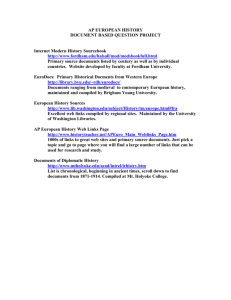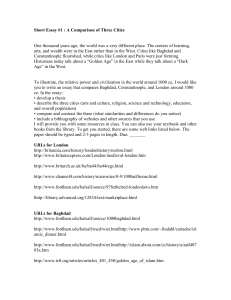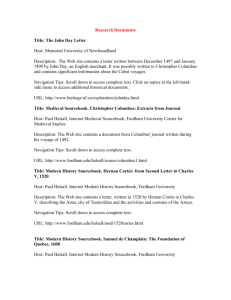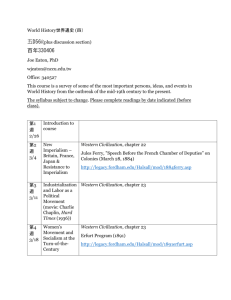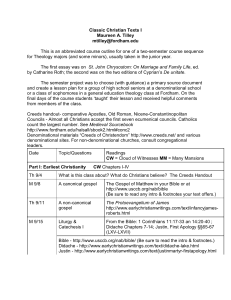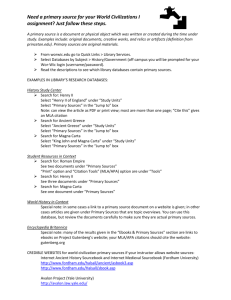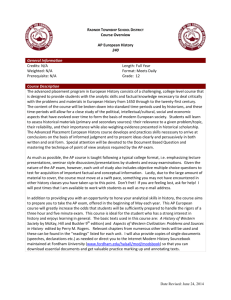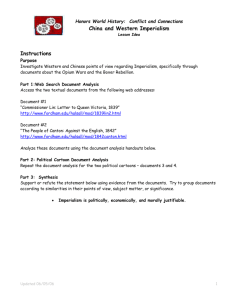History 70B Modern Europe Soc Science Building 2 room 363
advertisement
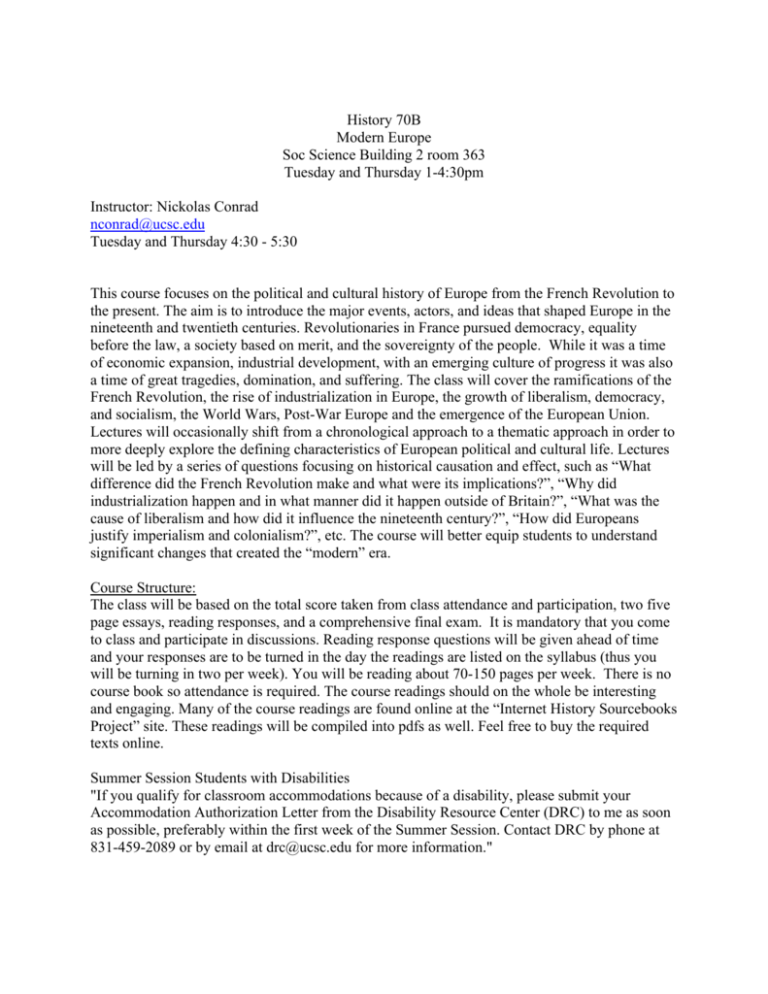
History 70B Modern Europe Soc Science Building 2 room 363 Tuesday and Thursday 1­4:30pm Instructor: Nickolas Conrad nconrad@ucsc.edu Tuesday and Thursday 4:30 ­ 5:30 This course focuses on the political and cultural history of Europe from the French Revolution to the present. The aim is to introduce the major events, actors, and ideas that shaped Europe in the nineteenth and twentieth centuries. Revolutionaries in France pursued democracy, equality before the law, a society based on merit, and the sovereignty of the people. While it was a time of economic expansion, industrial development, with an emerging culture of progress it was also a time of great tragedies, domination, and suffering. The class will cover the ramifications of the French Revolution, the rise of industrialization in Europe, the growth of liberalism, democracy, and socialism, the World Wars, Post­War Europe and the emergence of the European Union. Lectures will occasionally shift from a chronological approach to a thematic approach in order to more deeply explore the defining characteristics of European political and cultural life. Lectures will be led by a series of questions focusing on historical causation and effect, such as “What difference did the French Revolution make and what were its implications?”, “Why did industrialization happen and in what manner did it happen outside of Britain?”, “What was the cause of liberalism and how did it influence the nineteenth century?”, “How did Europeans justify imperialism and colonialism?”, etc. The course will better equip students to understand significant changes that created the “modern” era. Course Structure: The class will be based on the total score taken from class attendance and participation, two five page essays, reading responses, and a comprehensive final exam. It is mandatory that you come to class and participate in discussions. Reading response questions will be given ahead of time and your responses are to be turned in the day the readings are listed on the syllabus (thus you will be turning in two per week). You will be reading about 70­150 pages per week. There is no course book so attendance is required. The course readings should on the whole be interesting and engaging. Many of the course readings are found online at the “Internet History Sourcebooks Project” site. These readings will be compiled into pdfs as well. Feel free to buy the required texts online. Summer Session Students with Disabilities "If you qualify for classroom accommodations because of a disability, please submit your Accommodation Authorization Letter from the Disability Resource Center (DRC) to me as soon as possible, preferably within the first week of the Summer Session. Contact DRC by phone at 831­459­2089 or by email at drc@ucsc.edu for more information." Grading 50% two 5­page papers 10% Reading Reponses to primary source readings 10% Class attendance and participation 30% Final Exam Required Texts To minimize costs to the students there are only three inexpensive and easy to acquire texts. The text book is optional and primarily a supplement to the lectures and a source to use when writing your essay. Copies are available in the library. Primo Levi, Survival in Auschwitz Erich Maria Remarque, All Quiet on the Western Front Slavenka Drakulic, How We Survived Communism & Even Laughed Recommended textbook as reference: Merriman, John. A History of Modern Europe: From the French Revolution to the Present. 2nd ed. New York: W. W. Norton & Company, 2010. Internet Site for primary source readings: Internet History Sourcebooks Project “The Internet History Sourcebooks Project is a collection of public domain and copy­permitted historical texts presented cleanly (without advertising or excessive layout) for educational use.” (http://www.fordham.edu/Halsall/index.asp Week 1 First Lecture: Revolution and Reaction, 1789­1848 Part One: The French Revolution and the Conservative Response Part Two: Liberalism, Socialism, Conservatism, Romanticism, 1815­1848 Second Lecture: 1848, liberalism, and the Industrial Revolution Part One: 1848, The Springtime of the People Part Two: Industrial Revolution and why Britain? Maximilien Robespierre (1758­94): On the Principles of Political Morality, 1794, excerpts: http://www.fordham.edu/Halsall/mod/1794robespierre.asp Declaration of Rights of Man and Citizen: http://www.hrcr.org/docs/frenchdec.html William Wordsworth (1770­1850): The Excursion, 1814: http://www.fordham.edu/Halsall/mod/1814wordsworth.asp Klemens von Metternich, Political Confession, 1820: http://www.fordham.edu/halsall/mod/1820metternich.html. Adam Smith: The Wealth of Nations, 1776, selection: http://www.fordham.edu/Halsall/mod/adamsmith­summary.asp Edwin Chadwick (1803­1890): Report on Sanitary Conditions, 1842: http://www.victorianweb.org/history/chadwick2.html Friedrich Engels, The Condition of the Working­Class in England in 1844.: http://www.fordham.edu/Halsall/mod/1844engels.asp Karl Marx and Friedrich Engels, The Communist Manifesto, chapters 1­2 (see http://www.anu.edu.au/polsci/marx/classics/manifesto.html) Week 2 First Lecture 1848­1870, Nationalism and Unification Part One: The Crimean War, the unification of Italy, the Second Empire Part Two: The unification of Germany, Victorian England, Austria­Hungary Giuseppe Mazzini (1802­1872): On Nationality as a Key to Social Development, 1852: http://www.fordham.edu/Halsall/mod/1852mazzini.asp Thomas Escott (1844­1924): England: Her People, Polity, and Pursuits, 1885: http://www.fordham.edu/Halsall/mod/1885escott.asp Samuel Smiles: Self Help, 1882: http://www.fordham.edu/Halsall/mod/1882smiles.asp John Leighton: One Day Under the Paris Commune, 1871: http://www.fordham.edu/Halsall/mod/1871leighton­commune.asp Léon Gambetta (1838­82): The Belleville Manifesto, 1869: http://www.fordham.edu/Halsall/mod/1869gambetta.asp Second Lecture 1870­1914, Bismarck's Europe and the New Imperialism Part One: Bismarck's Europe Part Two: The New Imperialism Extent of European Colonialism in Statistical Terms: https://www.mtholyoke.edu/acad/intrel/pol116/colonies.htm British Missionary Letters: Urging the Annexation of The South Sea Islands, 1883: http://www.fordham.edu/Halsall/mod/1883hebrides.asp John Stuart Mill: On Colonies and Colonization, 1848 http://www.fordham.edu/Halsall/mod/1849jsmill­colonies.asp Joseph A. Schumpeter: The Sociology of Imperialism, 1918 : http://www.fordham.edu/Halsall/mod/1918schumpeter1.asp Jules Ferry (1832­1893): “On French Colonial Expansion,” 1884: http://www.fordham.edu/Halsall/mod/1884ferry.asp Rudyard Kipling (1865­1936): “The White Man's Burden,” 1899: http://www.fordham.edu/Halsall/mod/kipling.asp Start Erich Maria Remarque, All Quiet on the Western Front Week 3 PAPER 1 DUE Lecture One: Crisis of Modernity, Pessimism and the Bell Époque Part One: Pessimism and the Crisis of Liberalism and Socialism Part Two: Middle class Culture and the Bell Époque? Pope Pius IX (b. 1792. pope. 1846­1878): Syllabus of Errors, 8 Dec 1864: http://www.ewtn.com/library/PAPALDOC/P9SYLL.HTM Herbert Spencer (1820­1903): Progress: Its Law and Causes, 1857, excerpts [At this Site] Social Darwinism by its founder. Note the date!: http://www.fordham.edu/Halsall/mod/spencer­darwin.asp Emile Durkheim, definition of “anomie”: http://www.britannica.com/EBchecked/topic/26587/anomie Max Weber and the modern age (section 4): http://plato.stanford.edu/entries/weber/ Freud, Civilization and Its Discontents: http://www.historyguide.org/europe/freud_discontents.html Lecture Two: World War I Part One: The causes of World War I Part Two: World War I Erich Maria Remarque, All Quiet on the Western Front Week 4 Lecture One The Communist Revolution and the Soviet System Part One: Russia and the Communist Revolution Part Two: The Soviet System Slavenka Drakulic, How We Survived Communism & Even Laughed Lecture Two Fascism and World War II Part One: the Interwar period, Germany, Italy and Fascism Part Two: Germany, World War II, the Holocaust Benito Mussolini (1883­1945): What is Fascism?, 1932: http://www.fordham.edu/Halsall/mod/mussolini­fascism.asp The 25 Points, 1920: http://www.fordham.edu/Halsall/mod/25points.asp Adolf Hitler: The Obersalzberg Speech: http://www.fordham.edu/Halsall/mod/hitler­obersalzberg.asp Start Primo Levi, Survival at Auschwitz Week 5 Lecture One: Post­War Europe, Reconstruction, and the European Union, the fall of Communism Part One: Post­War Europe, Reconstruction, Cold War Part Two: the European Union and the fall of Communism Finish Primo Levi, Survival at Auschwitz Lecture Two: last day of class PAPER 2 DUE FINAL EXAM
